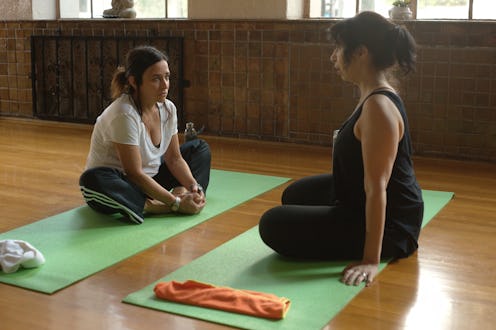Entertainment
Pamela Adlon Hopes Her Menopause Story On 'Better Things' Makes Women Feel Less Alone

Spoilers ahead for Better Things Season 3, Episode 5. "This is normal," Sam on Better Things is told by her gynecologist. "You're degenerating." Pamela Adlon's character is finally entering perimenopause, and she can't wait. While her combat boots are firmly in the stirrups at her gynecologist's office, she expresses how excited she is to grow a full beard — or a soul patch. But while she jokes about the aging process, it's clear that it's no walk in the park.
On top of raising three obstinate daughters — the two youngest of whom seem hellbent on killing each other these days — Sam is also having to contend with her mother's failing mental state, her own health problems, and extremely high stress levels. Not only is she having nightmares about her ex-husband repeatedly raping her, but as we saw in last week's episode, things aren't going great at work, either.
Thankfully, Sam is able to let loose with some friends at an Italian restaurant, where they do coke in the bathroom, drink an exorbitant amount of wine, and shamelessly flirt with the male waiters. It's perhaps important to note that one of Sam's friends, Jaia (Jen Richards), is a trans woman, but it's neither mentioned nor called attention to (Richards has appeared in previous episodes of Better Things). But by including both WOC and a trans woman, Adlon quietly portrays a diverse swath of femininity.
But even as these hunky, Italian waiters are filling the women's mouths with whipped cream, Sam's friends know that the men are only humoring them. "When they do that, it makes me feel like we're in wheelchairs lined up outside the nursing home," Sam laments to her friend Lala (Judy Reyes), later saying, "We're irrelevant." Lala returns, "We're obsolete." "We're disgusting," Sam concludes.
Indeed, it's no secret that women past 40 are virtually invisible in society, and their changing bodies certainly aren't often discussed in such explicit detail. "The invisible woman might be the actor no longer offered roles after her 40th birthday, the 50-year-old woman who can't land a job interview, or the widow who finds her dinner invitations declining with the absence of her husband," author Akiko Busch wrote in the Atlantic. "She is the woman who finds that she is no longer the object of the male gaze — youth faded, childbearing years behind her, social value diminished."
Fortunately, the tide is slowly changing in the entertainment industry. Of course The Golden Girls is the classic example of older women starring in leading roles, and more recent additions include Grace and Frankie, The Good Wife, and now The Good Fight, among others. What's more, Amy Schumer cleverly skewered Hollywood's ageist, sexist tendencies in "Last F*ckable Day," starring Patricia Arquette, Tina Fey, and Julia Louis-Dreyfus celebrating the latter's last day of being f*ckable.
The Veep actor explained to a confused Schumer in the clip, "In every actress's life, the media decides when you finally reach the point where you're not believably f*ckable anymore." In this case, the beautiful Seinfeld star received the unspoken message that her time had come.
Likewise, Sam and her friends are struggling to accept the fact that this is it for them. Tipsy on wine, Ida (Rose Abdoo) claims that she's going to leave her husband, while Lala jokes about her sagging belly. But deep down, it's clear that they have mixed feelings, at the very least, about their age. On one hand, Sam can't wait to stop having raging periods, which have been lasting for weeks. On the other, it means her body is "degenerating," as her OBGYN said.
In the opening shots of Season 3, audiences saw Sam squeezing into her old clothes, incensed that they no longer fit. It's an extremely vulnerable scene, and one that Adlon hesitated to shoot. "By the end of Season 2 my body changed so dramatically," she told Variety. "All of a sudden I can't fit into the pants I was wearing three months ago. So I went through this in my closet. I just started putting on clothes and throwing them away. And then I thought, I should save the ones that don't fit for the show."
Initially, the showrunner was going to shoot the scene in a more flattering way, telling Variety, "I thought, 'I'm never going to do this. I'm never going to do this.' I was going to do it with smoke and mirrors, and then I shot a scene with some other women, and I realized, I can't f—ing ask them to do what they did and not do my thing." Adlon echoed this sentiment in an interview with NPR, saying:
"[When] you get into your 50s, your metabolism does funky things. I decided that it would be a very generous thing for me to kind of illustrate it in my show, so everybody doesn't feel so alone. That happened to me, and you sit there, and you're by yourself. And for people, women in particular, when our bodies don't measure up to what our idea is of what we're supposed to look like with our clothes off in the mirror, that's a shocking thing."
As with most everything in Better Things, both the clothes scene and the girls' night out storyline aren't played for laughs, per se — rather, they're both darkly comic. After all, when your stomach is trying to have sex with your vagina, as Lala jokingly tells Sam at dinner, what can you do but laugh about it?
And although aging is neither pretty nor easy — as a hungover Sam discovers the next day — it's vital that these sort of storylines are being portrayed onscreen. As Sam tells Lala at dinner, both crying and laughing, "You realize this is as good as we're ever going to look, right? It's just going to go downhill from here."